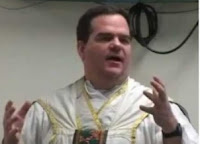This email is posted with some redaction, and with full permission from the original sender. Emphasis and links are mine:
+JMJ+
Gentlemen,
I have had conversations with most of you on the subject topic. Most of you know my thoughts on the virus, and that I have never worn a face mask in response. Generally speaking the push to wear masks, and the information behind it seems to be driven as part of a propaganda effort. Use of social media, participation in echo chambers, and reliance on a daily dose of other forms of media seem to drive this propaganda. People willingly participate in the media they consume and are impacted by it.
It should go without saying, but to make sure it is clear... I do not fear the virus. I am not worried about how my personal consumeristic urges might be impacted. I have been willing to suffer the consequences of my actions for a while now.
People can come to similar conclusions, and perform similar actions for very different reasons. This is relevant because I have heard reasons for NOT wearing a mask that are unsound. I have also heard repetition of "pre-recorded sophistry" (internet memes and quick one liners) that leads me to wonder if NOT wearing masks has also become a propaganda effort.
It is not a surprise that opposing propaganda efforts would exist over a subject. I am worried however that if I am right, that the result will lead to division for the wrong reasons. Division over good reason is bound to happen, but division over wrong reasons is just wrong.
I also know that covering one's face with a mask is not objectively wrong. Chances are there are circumstances where most of us have performed this action at some point in our lives. Reasons for wearing a mask certainly exist that could make the act wrong, or at the very least undesirable.
I am sharing my thoughts to caution you all from getting sucked into false dichotomies, or getting sucked into divisive attitudes that are not likely required. At the very least I would be cautious of letting the subject take up to much mental thought. There is certainly a battle here taking place, but maybe this is the wrong "front" to spend all the energy on with those around us and those we interact with.
I welcome any of your thoughts, but please remember, this is not social media. I do not need to be convinced of the ridiculous circumstance we are in. Chances are high that I have read "the science", "statistics", and "politics" and seen all of the same things you all have seen. This is not about convincing anyone to wear/not wear a mask. I am keeping a more concerned eye on the strange divisiveness of this specific topic, and urge you to do the same.
Mary keep you,




